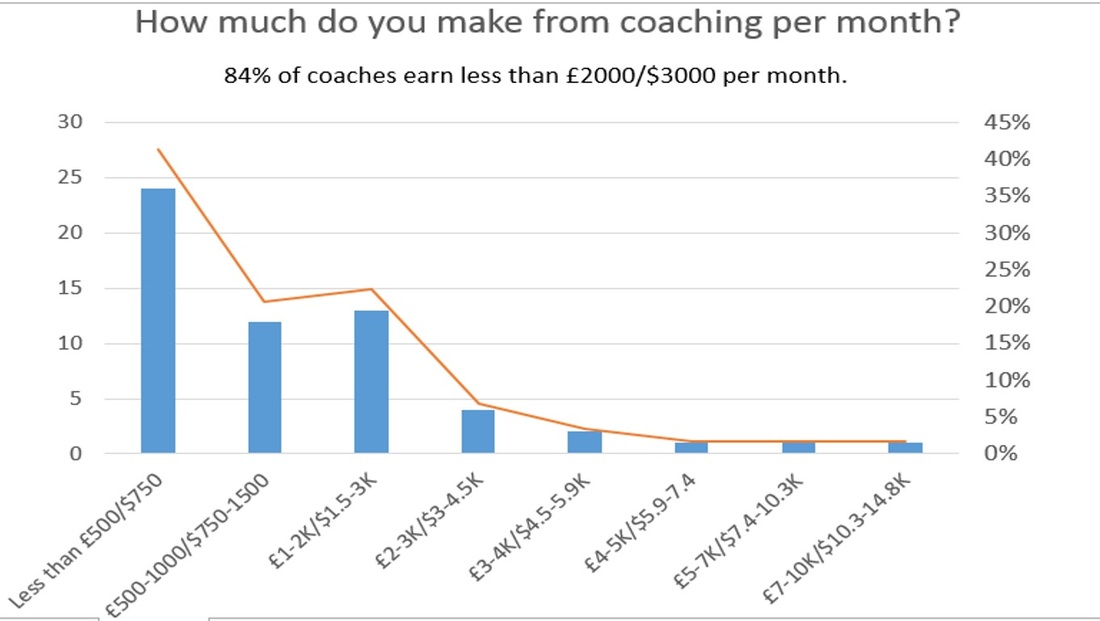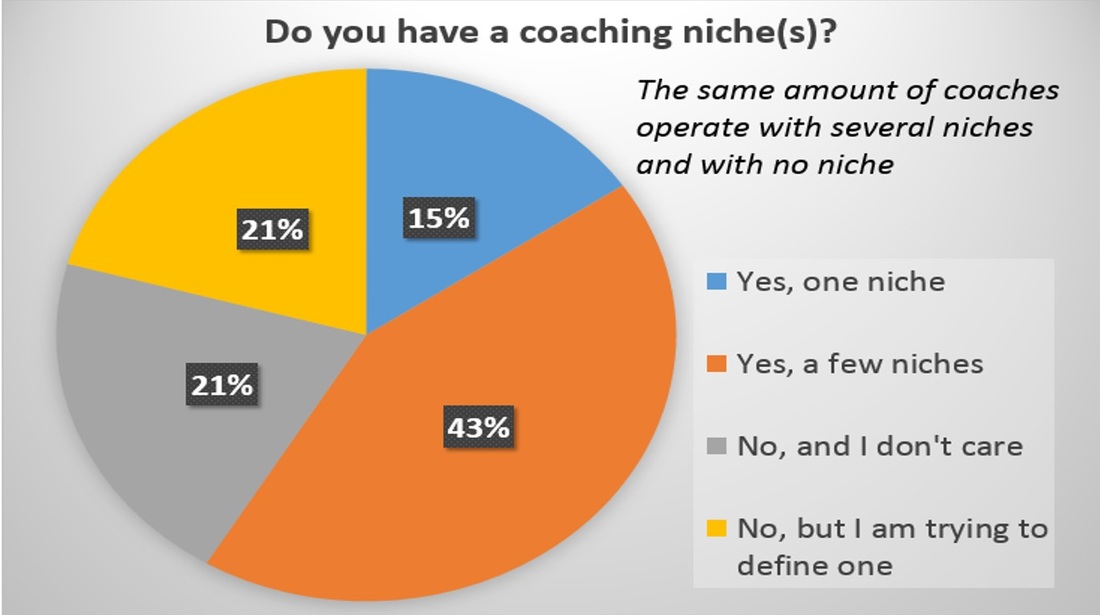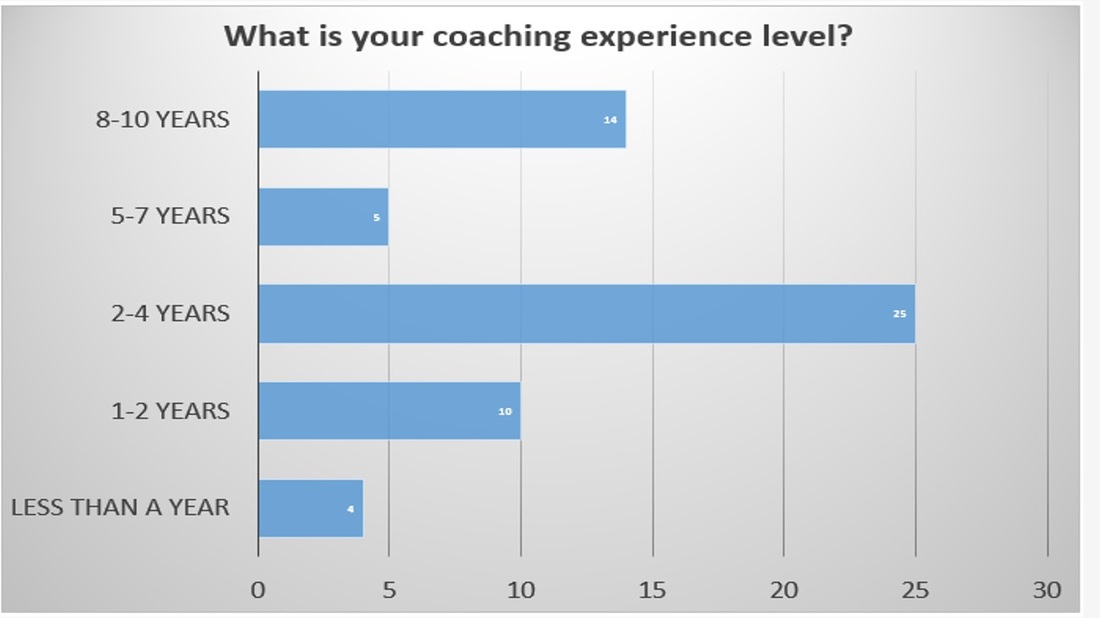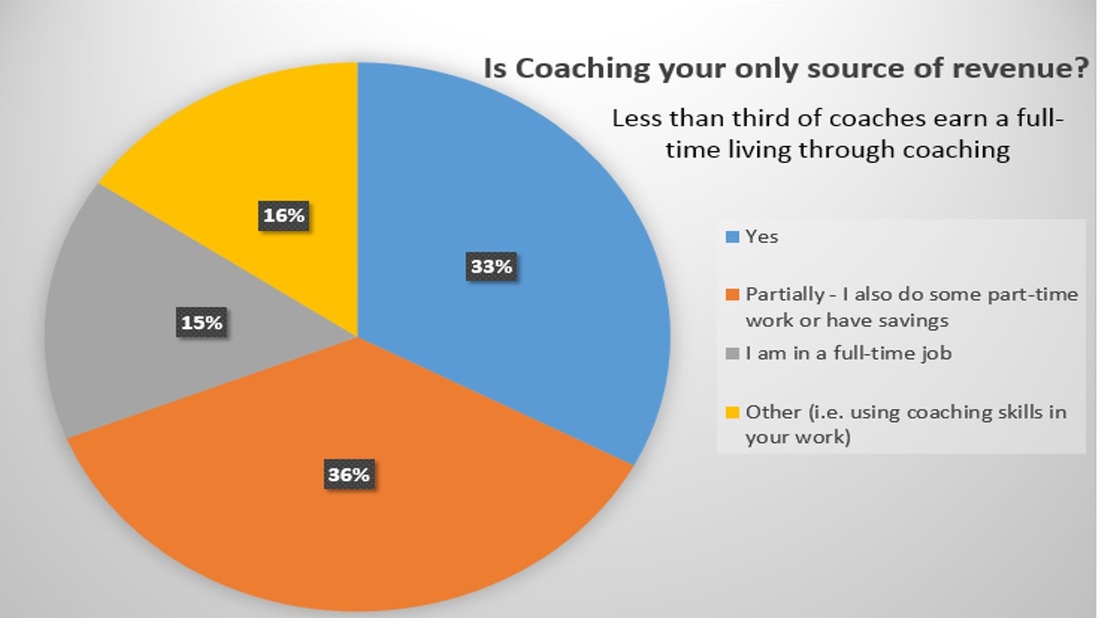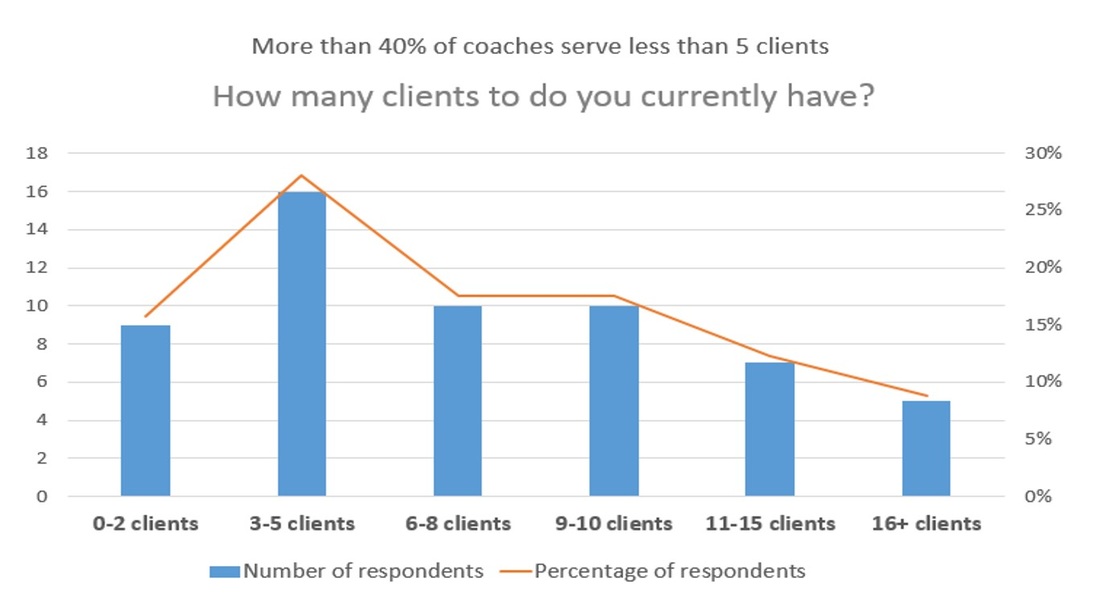Coaching might be an incredibly fulfilling job, but not necessarily the most rewarding one. A staggering 84% of coaches make less than £2000/$3000 per month, and 40% of them earn less than £500/$750, according to Anastasia’s survey conducted in early January 2016*. Only 8.6% coaches take home more than £3000/$4500 per month from coaching.
Interestingly, £2000/$3000 in monthly earnings seems to be the most difficult barrier to overcome for coaches after the initial barrier of £500/$750.
Notably, most of the respondents (87%) came from the developed English-speaking markets, so these rather disappointing earnings figures do not reflect the level of economic development, but rather the competitiveness of the coaching market, as well as the fact that aspiring coaches might be spending their precious time on things that are less important, than they think.
Interestingly, £2000/$3000 in monthly earnings seems to be the most difficult barrier to overcome for coaches after the initial barrier of £500/$750.
Notably, most of the respondents (87%) came from the developed English-speaking markets, so these rather disappointing earnings figures do not reflect the level of economic development, but rather the competitiveness of the coaching market, as well as the fact that aspiring coaches might be spending their precious time on things that are less important, than they think.
Having only a few clients is one of the reasons coaches earn so little – 44% of coaches serve 5 or fewer clients, and nearly 4/5 – less than 10. At the same time, coaches who serve more than 10 clients start earning considerably more. It feels like some of us find ways to serve most clients.
Another reason for low earnings might be that coaches spend too much time trying to formulate a niche or getting locked in one (21% claim they haven’t defined a niche, but are trying to do so, and 15% that they only have one niche), whereas the highest earners claim they either have no niche at all and can’t bother to define one, or that they cover several niches. Both of these approaches seem to work.
(The lack of) experience seems to be relevant only for the first two years of your coaching practice. Two years seems to be the time when we are figuring out what and how to do. The two top earners have 8-10 years of experience, but two mid-range ones only have 2-4 years, and one claims to have 5-7 years of experience. So if you have been in the profession for more than 2 years, in theory there’s nothing limiting you – apart from yourself.
Another reason for low earnings might be that coaches spend too much time trying to formulate a niche or getting locked in one (21% claim they haven’t defined a niche, but are trying to do so, and 15% that they only have one niche), whereas the highest earners claim they either have no niche at all and can’t bother to define one, or that they cover several niches. Both of these approaches seem to work.
(The lack of) experience seems to be relevant only for the first two years of your coaching practice. Two years seems to be the time when we are figuring out what and how to do. The two top earners have 8-10 years of experience, but two mid-range ones only have 2-4 years, and one claims to have 5-7 years of experience. So if you have been in the profession for more than 2 years, in theory there’s nothing limiting you – apart from yourself.
The moral is, if you’ve been in coaching for less than 2 years, don’t waste your time on defining your coaching niche or coming up with complicated marketing strategies – try to get as many clients as you can, and things will work out. Also, don’t leave your full-time job just yet (or make sure you’ve got someone to support you through the first 2 years).
If you’ve been playing with coaching for 2 or more years, and are still earning less than £2000/$3000 per month (and come from a major English-speaking country), maybe it’s time to face the truth that things aren’t going to change unless you make an effort, and you might as well continue to earn the same for the next ten years. Get over this psychological barrier of £2000/$3000 per month – somehow only a few people are capable of doing that, and once they’re on the other side, there isn’t much competition there. So do everything to cross this line – and maybe you’ll make it to my next year’s report as a top-5 earner.
If you’ve been playing with coaching for 2 or more years, and are still earning less than £2000/$3000 per month (and come from a major English-speaking country), maybe it’s time to face the truth that things aren’t going to change unless you make an effort, and you might as well continue to earn the same for the next ten years. Get over this psychological barrier of £2000/$3000 per month – somehow only a few people are capable of doing that, and once they’re on the other side, there isn’t much competition there. So do everything to cross this line – and maybe you’ll make it to my next year’s report as a top-5 earner.
*About the survey
This anonymous survey was conducted by Anastasia from between the 4th-8th January 2016. It was published in 5 online professional coaching groups and communities (two on Linkedin, two on Facebook and a forum of CTI graduates) and collected a total of 58 answers. Participants from USA, the UK and Canada gave 87% of responses. Other respondents came from Australia, Germany, India, Israel, Peru, South Africa and the United Arab Emirates. Because this study was conducted online only and participants were self-selected, one should not assume that this survey is fully representative of the situation with the coaching industry as a whole. However, we believe that the trends outlined in this research are representative enough to generate a discussion of skills coaches need to get to grow their businesses.
USD/GBP exchange rates are not entirely representative, as USD rate has been rounded to the nearest hundred.
For press enquiries, please use the contact form. Any republishing only with the link to www.anastasia.tips website, please.
This anonymous survey was conducted by Anastasia from between the 4th-8th January 2016. It was published in 5 online professional coaching groups and communities (two on Linkedin, two on Facebook and a forum of CTI graduates) and collected a total of 58 answers. Participants from USA, the UK and Canada gave 87% of responses. Other respondents came from Australia, Germany, India, Israel, Peru, South Africa and the United Arab Emirates. Because this study was conducted online only and participants were self-selected, one should not assume that this survey is fully representative of the situation with the coaching industry as a whole. However, we believe that the trends outlined in this research are representative enough to generate a discussion of skills coaches need to get to grow their businesses.
USD/GBP exchange rates are not entirely representative, as USD rate has been rounded to the nearest hundred.
For press enquiries, please use the contact form. Any republishing only with the link to www.anastasia.tips website, please.
Do you want to make a breakthrough in your coaching practice?
| Anastasia worked for 10+ years in senior positions in digital marketing before founding her two coaching businesses. One works with highly sensitive people and the other is a digital detox business. | I work with highly sensitive people, many of whom choose to be in helping professions. In spring 2016, I will be running Career Booster workshop for highly sensitive people, teaching them to use their sensitivity and intuition to build their successful business or career. Whereas many of you have invested a lot of time in learning skills how to be a great coach, and thanks to your sensitivity you are very capable of delivering great results for the client, you might be lacking business skills, or feeling overwhelmed at the idea of having to expose yourself online, market to the unknown people etc. However, digital marketing doesn't have to be inauthentic or overwhelming. If you want to have a breakthrough in your business based on who you are, you are looking for authentic ways to express yourself online and get new clients, the spring edition of Career Booster is for you. Read more, or ask me any questions! |

